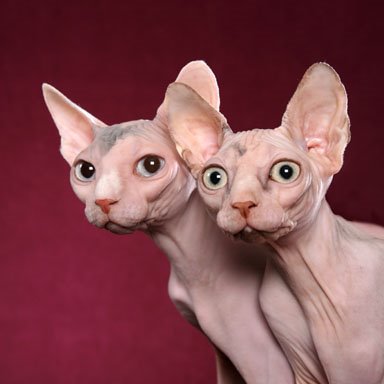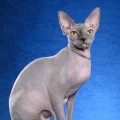Origin – History
This cat breed is one of a group of cats that came about because of a natural and spontaneous genetic mutation of a recessive gene. On this occasion the event took place in Toronto Canada in 1966 (although it seems that this line of Sphynx cats died out due to a failed breeding program, but see below).
The breed is therefore otherwise known as the “Canadian Hairless”, “Moon Cat” and “Moonstone Cat”. There are, though, well documented instances of the hairless cat mutation occurring many times before 1966 without attracting sufficient attention for a new breed to be formed from the mutation. For example, in 1830 in Latin America and in many other countries including England, Australia, USA and Russia, to name a few.

A notable example of another occurrence of this genetic mutation would be the birth of brother and sister “Dick” and “Nellie”, Mexican hairless cats of 1902 (there are, though, recorded instances of hairless cats going back as far as the 1830s). It seems that Dick and Nellie were quite famous. They were given to E J Shinick, Albuquerque, New Mexico by the Pueblo Indians. Mr Shinick did not mate Nellie. While Dick, although a strong healthy cat, was killed by dogs. Dick liked to sneak out of the house despite Mr Shinick’s best efforts and was attacked. Mr Shinick said he would have survived one dog but not a group of dogs. Mr Shinick was aware of the rarity of his cats and their value. They were valued at $1000 (about $20,000 today) each and he valued Nellie at $300 (about $6,000 today).
Another example is the story of a cat named “Nonesuch”. So named as the owner wasn’t sure if the animal was a cat or a dog. The time: mid 1936. The place: USA – Wilmington. The parents were ordinary cats and the occurrence was put down to a recessive genetic mutation. This event sparked a certain Professor Etienne Letard, in France, to write about “Hairless Siamese Kittens And Their Parents” (the “French Bald Cat”). There is also the dominant gene mutation that results in a hairless cat named the Don Sphynx (Russia 1987) and the Hawaiian Hairless (or Kohana Kat). This mutation was noticed in 2002 in Hawaii. The hairlessness is different as there are no hair follicles as opposed to a very small amount of downy hair.






Hi there. The default is that a person receives replies to their comment. That is what should happen. You shouldn’t have many replies because very few people comment on this page. Not sure how you stop that. I’ll check it out. It is a plugin for WordPress.
When I initially commented I appear to have clicked the -Notify me when new comments are added- checkbox and from now on
each time a comment is added I get four emails with the exact same comment.
Perhaps there is a means you can remove me from that service?
Cheers!
I wish I could have one. The gray ones seem to look nicest. I love all cats.